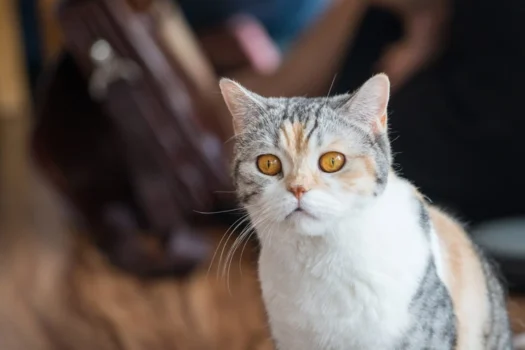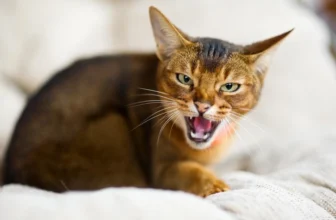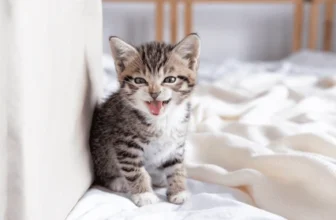As much as we adore our American Wirehair felines, it can be challenging to understand what they’re trying to communicate when they meow. While meowing is a natural behavior in cats, excessive meowing can be a cause for concern. As a devoted cat owner, it’s essential to differentiate between normal and excessive meowing behavior to ensure the health and well-being of your furry friend. This article aims to help you understand the causes behind your American Wirehair’s excessive meowing and what you can do to address it.
Normal vs. Excessive Meowing
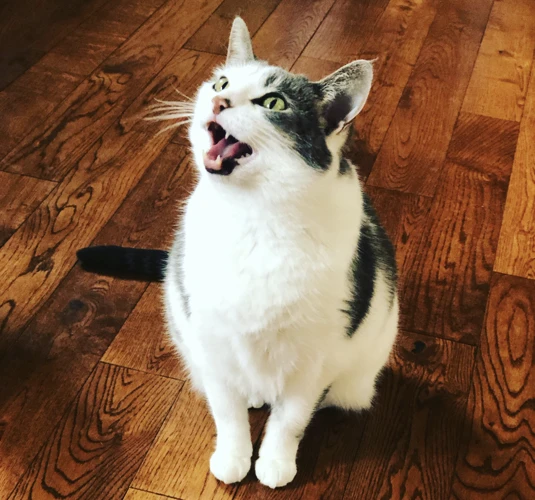
As a pet owner, it’s important to be able to distinguish between normal and excessive meowing in your American Wirehair. While some meowing is to be expected, excessive meowing may indicate an underlying health or behavioral problem. Understanding the difference between the two can help you determine when to seek professional help. In this section, we will explore the characteristics of both normal and excessive meowing in American Wirehairs, and provide tips on how to address this issue. For more information on excessive meowing in American Wirehairs, check out our article on common causes and treatment options.
Understanding Normal Meowing
As a Wirehair owner, it’s essential to understand the frequency and reasons behind your pet’s meows to avoid mistaking them for excessive meowing. In this section, we’ll delve into the normal reasons why American Wirehairs meow.
Typical Causes of Normal Meowing:
| Reasons | Explanation |
|---|---|
| Hunger | Meowing before or after mealtime to indicate hunger. |
| Attention seeking | Meows to get your attention and be petted or played with. |
| Excitement | Meows with elevated tone and pitch due to excitement from seeing a toy or treats. |
| Communication | Meowing to communicate with their owners or other cats. |
| Playfulness | Meowing while running, jumping, or playing with their owner. |
Understanding normal meowing can help you tell when your Wirehair is communicating with you and when its meowing is a sign of physical or emotional distress. However, if your pet seems to be meowing excessively, you should evaluate the situation to identify any underlying issues that need attention.
If you’re unsure how to interpret your American Wirehair’s meowing behavior, you can visit our page on American Wirehair body language and meowing tips to get more insights into their behavior and communication.
Identifying Excessive Meowing
Excessive meowing in American Wirehairs can be a cause of concern for their owners. It may indicate an underlying health or behavioral issue, or just be a sign that their environment needs to be modified. To properly address excessive meowing, it is important to first identify it.
How to Identify Excessive Meowing:
| Sign | Description |
| Vocalization at night | If your American Wirehair is keeping you up at night with excessive vocalization |
| Frequent meowing | If your cat is meowing more than usual, it may be considered excessive |
| Aggressive meowing | If your cat’s meowing has become more intense or aggressive, it may be a sign of a behavioral issue |
| Change in meowing behavior | If your cat’s meowing behavior has significantly changed, it may be a sign of a health issue or environmental factor |
If you notice any of these signs of excessive meowing, it’s important to take action to address the issue. A great resource for tips on how to reduce meowing in your American Wirehair can be found at /american-wirehair-meowing-tips/. Additionally, training techniques to help your American Wirehair meow less can be found at /train-american-wirehair-meow-less/. Providing plenty of playtime throughout the day can also help reduce meowing in American Wirehairs, and more information on this can be found at /playtime-reduce-meowing-american-wirehair/. However, if meowing behavior continues despite these changes, it may be a sign of a medical condition. More details on potential medical conditions that can cause excessive meowing can be found at /med-conditions-meowing-wirehairs/. Additionally, if the meowing is due to separation anxiety, which is a common issue for American Wirehairs, tips for addressing this can be found at /separation-anxiety-and-excessive-meowing-in-american-wirehairs/.
Causes of Excessive Meowing
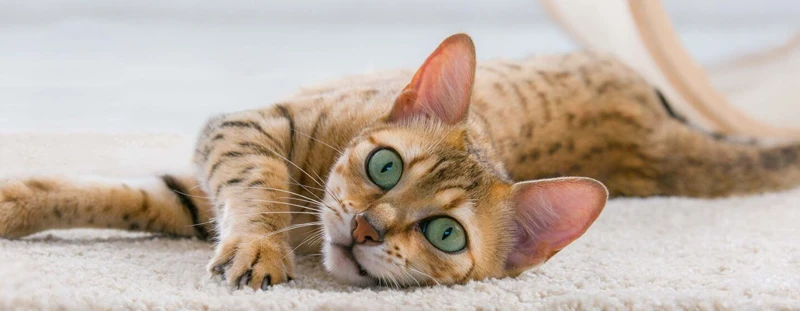
As a cat owner, excessive meowing from your American Wirehair can leave you feeling perplexed and concerned. It’s important to understand that there are various reasons why your furry friend might be meowing more than usual. In this section, we’ll explore some of the potential causes of excessive meowing, so you can identify what might be causing your cat’s behavior. From health issues to environmental factors and more, read on to learn about the possible reasons behind your cat’s constant vocalization.
Health Issues
When it comes to excessive meowing in American Wirehairs, health issues can sometimes be the underlying cause. The following table outlines some of the health issues to be aware of in your feline friend:
| Health Issue | Symptoms |
|---|---|
| Hyperthyroidism | Increased appetite, weight loss, excessive meowing, restlessness, increased thirst and urination, vomiting, diarrhea |
| Urinary Tract Infection | Inappropriate urination outside the litter box, excessive grooming of genital area, painful urination, strong odor in urine |
| Arthritis | Limping, reluctance to jump or climb, stiffness, lethargy, decreased activity level, irritability when touched in certain areas |
If you suspect that your American Wirehair is suffering from any of these health issues, it is important to seek veterinary care as soon as possible. Your vet will be able to diagnose the issue and provide treatment options. Prompt treatment can prevent the condition from progressing and causing further health problems for your furry friend.
Behavioral Issues
Behavioral issues can also be a cause of excessive meowing in American Wirehairs. If your cat is meowing loudly and persistently, it could be a sign of anxiety, stress, or attention-seeking behavior. Here are some common behavioral issues that can lead to excessive meowing:
- Boredom: American Wirehairs are intelligent and active cats. If they don’t receive enough stimulation and exercise, they can become bored and resort to meowing to get attention or entertainment. Make sure your cat has plenty of toys and opportunities for play.
- Anxiety: Cats can suffer from anxiety, just like humans. If your American Wirehair is meowing excessively, it could be due to separation anxiety or fear of certain stimuli. Try to identify the trigger and provide your cat with comfort and reassurance.
- Territoriality: American Wirehairs can be territorial cats. If they perceive a threat to their territory or feel like their space is being invaded, they can become vocal in an attempt to defend their turf. Ensure your cat has their own space and territory.
- Mating Behavior: Unneutered male American Wirehairs will often meow excessively when they are in heat and looking to mate. Consider getting your cat neutered to alleviate this behavior.
It is important to address any behavioral issues that may be causing excessive meowing in your American Wirehair. Talk to your veterinarian and consider consulting with a cat behaviorist to help modify your cat’s behavior and alleviate their anxiety or stress. Providing your cat with an enriching and comfortable environment, along with positive reinforcement, can go a long way in addressing behavioral issues and reducing excessive meowing.
Environmental Factors
It’s important to consider the environmental factors that could be contributing to your American Wirehair’s excessive meowing. These environmental factors can include both physical and emotional factors that impact your cat’s behavior. Here are some factors to keep in mind:
- Loneliness: As social creatures, cats can become lonely and bored if left alone for long periods of time. This can lead to increased meowing and other attention-seeking behaviors. Consider spending more time with your cat or possibly getting another cat for companionship if they seem to be lonely.
- Lack of Stimulation: American Wirehairs are an intelligent breed that require plenty of stimulation and exercise to keep them happy and healthy. Without enough stimulation, your cat may become bored and develop excessive meowing as a way to seek attention. Make sure your cat has plenty of toys, scratching posts, and other forms of mental and physical stimulation.
- Changes in Routine: Cats thrive on routine, and any changes in their routine can cause stress and anxiety. This stress can manifest itself in the form of excessive meowing. If you’ve recently moved, changed their diet, or made any other significant changes to their routine, it may be causing them distress.
- Unwanted Attention: If your American Wirehair receives unwanted attention from other pets or children in the household, this can cause stress and anxiety. Your cat may resort to excessive meowing as a way to communicate their discomfort.
- Restricted Access: If your cat is confined to a small space or doesn’t have access to certain areas of the home, they may develop excessive meowing as a way to communicate their frustration. Try giving your cat access to all areas of the home or consider providing them with more space.
It’s important to keep all of these environmental factors in mind when trying to address your American Wirehair’s excessive meowing. By addressing any underlying issues, you can help your cat lead a happier and more comfortable life.
How to Address Excessive Meowing
Dealing with an American Wirehair that excessively meows can be perplexing and frustrating for owners. However, it is important to approach the situation with patience and understanding. With the right strategies and techniques, you can address your cat’s excessive meowing and promote a peaceful living environment for both you and your feline companion. Here are some proven tips and methods to help you address and tackle excessive meowing head-on.
Visit Your Veterinarian
If your American Wirehair is exhibiting excessive meowing, it is important to take them to a veterinarian for a check-up. By taking them to a veterinarian, you can rule out any underlying health issues that may be causing their behavior. The following table outlines some possible health issues that may be contributing to excessive meowing in cats:
| Possible Health Issue | Description |
|---|---|
| Hyperthyroidism | A condition where the thyroid gland produces too much thyroid hormone, leading to symptoms such as weight loss, increased appetite, and excessive meowing. |
| Urinary Tract Infection | A bacterial infection that affects the urinary tract, causing symptoms such as pain while urinating, frequent urination, and excessive meowing. |
| Dental Problems | Issues with teeth or gums such as tooth decay or gum disease can lead to pain and discomfort that can result in excessive meowing. |
| Arthritis | Inflammation of the joints that can cause pain and discomfort, leading to excessive meowing as a way of communicating their discomfort. |
By ruling out any health issues, you can focus on addressing any behavioral or environmental factors that may be contributing to your American Wirehair’s excessive meowing.
Rule Out Health Issues
When dealing with excessive meowing in American Wirehairs, it is important to rule out any underlying health issues that may be causing this behavior. This can be done by taking your cat to the veterinarian for a thorough physical examination.
During the exam, the veterinarian may take blood and urine samples to check for any abnormalities or infections. They may also conduct an ultrasound or X-ray to examine your cat’s internal organs.
Here are some specific health issues that may cause excessive meowing:
- Hyperthyroidism: This condition occurs when the thyroid gland produces too much thyroid hormone. Symptoms include weight loss, increased appetite, and excessive meowing.
- Urinary Tract Infections: This can cause pain and discomfort, leading to excessive meowing. Other symptoms include urinating outside the litter box and blood in the urine.
- Dental Issues: Painful teeth or gums can cause your cat to meow excessively. Look for signs of difficulty eating, drooling, and bad breath.
- Cognitive Dysfunction: This is a condition similar to Alzheimer’s in humans and can cause confusion, disorientation, and excessive vocalization.
If your veterinarian rules out any health issues, it is time to consider other possible causes for your American Wirehair’s excessive meowing.
Modify Your American Wirehair’s Environment
One way to address excessive meowing in your American Wirehair is to modify its environment. Cats are creatures of habit and routine, so even small changes to their environment can have a big impact on their behavior. Here are some tips for modifying your American Wirehair’s environment:
- Provide Entertainment: Make sure your American Wirehair has plenty of toys to play with. Interactive toys, such as puzzle feeders or wand toys, can help keep your cat mentally stimulated and provide an outlet for their energy, which may reduce excessive meowing.
- Create a Safe Space: Cats like to have their own space where they can retreat when they want to be alone. Provide your American Wirehair with a comfortable bed or cat tree in a quiet corner of the house. This will give your cat a safe space where they can relax and feel secure.
- Keep the Litter Box Clean: American Wirehairs, like all cats, are very particular about their litter box. If the litter box is dirty or smells bad, your cat may meow excessively to signal that it’s time for you to clean it. Make sure to scoop the litter box at least once a day and completely change the litter every two weeks.
- Set a Routine: Cats thrive on routine, so try to keep a consistent schedule for feeding, playtime, and other activities. This will help your American Wirehair feel more secure and reduce anxiety, which can lead to excessive meowing.
- Reduce Stress: American Wirehairs can be sensitive to changes in their environment, such as new pets or loud noises. If you suspect that your cat is meowing excessively due to stress, try to identify the source of the stress and remove it if possible. You can also use pheromone sprays or diffusers to help calm your cat.
- Provide Scratching Posts: Scratching is a natural behavior for cats, so it’s important to provide plenty of sturdy scratching posts throughout your house. This will give your American Wirehair an outlet for their natural instincts and may reduce excessive meowing.
By modifying your American Wirehair’s environment, you may be able to reduce excessive meowing and help your cat feel more comfortable and secure in their home. If you’re still having trouble, it may be necessary to seek the guidance of a professional animal behaviorist or your veterinarian.
Use Positive Reinforcement to Modify Behavior
One effective way to address excessive meowing in American Wirehairs is by using positive reinforcement techniques. Rewarding good behavior and gently discouraging negative behavior is an effective way to modify your cat’s behavior. Here are some ways you can use positive reinforcement to modify your cat’s meowing behavior:
- Encourage Quiet Behaviors – When your cat is quiet and not meowing excessively, offer positive reinforcement in the form of treats, toys, or affection. This will encourage your cat to continue exhibiting this quiet behavior in the future.
- Redirect Their Attention – If your cat is meowing excessively for attention, provide toys or puzzle feeders to redirect their focus away from meowing. Offer praise and affection when they engage with the toy or feeder instead of meowing.
- Discourage Negative Meowing – If your cat is meowing excessively for negative reasons, such as discomfort or hunger, address the underlying issue first. Once the issue is resolved, redirect their attention to an activity that will discourage meowing, such as playing with a toy.
- Create a Positive Environment – Provide plenty of toys, hiding spots, and comfortable resting areas for your American Wirehair. This will encourage them to engage in positive behaviors rather than meowing excessively.
Remember to be patient and consistent when using positive reinforcement techniques. It may take time for your cat to modify their meowing behavior, but with patience and consistency, positive reinforcement can be an effective way to address excessive meowing in American Wirehairs.
Conclusion
In conclusion, if you are a proud owner of an American Wirehair, you must know that meowing is a normal behavior for your furry friend, but excessive meowing can be an indication of a problem. It is important to understand the difference between normal and excessive meowing so you can address any underlying issues.
It is crucial to identify the cause of excessive meowing, which can be due to health issues, behavioral issues, or environmental factors. Visiting your veterinarian is the first step in identifying and addressing any health issues that your American Wirehair may be experiencing.
Modifying your cat’s environment can also help address excessive meowing. Simple modifications such as providing toys, food puzzles, and scratching posts can help keep your American Wirehair entertained and mentally stimulated. Using positive reinforcement to modify behavior is also an effective tool in addressing excessive meowing.
Remember, your American Wirehair is a loving and intelligent companion. As a responsible cat owner, your efforts to understand and address your cat’s behavior will help ensure they experience the best possible quality of life. By providing a safe, nurturing, and stimulating environment, your American Wirehair will thrive and be a happy part of your family for years to come.
Frequently Asked Questions
What is the average amount of meowing for an American Wirehair?
The average amount of meowing for an American Wirehair varies, but generally, they are not a particularly vocal breed.
How can I tell if my American Wirehair’s meowing is excessive?
If your American Wirehair is meowing excessively, it will likely be loud, frequent, and persistent, and may be accompanied by other behaviors such as pawing at you or objects around the house.
Can health issues cause excessive meowing in American Wirehairs?
Yes, health issues such as cognitive dysfunction, hyperthyroidism, or dental pain can cause excessive meowing in American Wirehairs.
How can I modify my American Wirehair’s environment to reduce excessive meowing?
You can modify your American Wirehair’s environment by providing them with plenty of toys, a comfortable place to sleep, and plenty of attention and affection. You should also try to reduce stress in their environment by keeping their surroundings calm and quiet.
Can hormonal changes affect meowing behavior in American Wirehairs?
Yes, hormonal changes such as those that occur during mating season can affect meowing behavior in American Wirehairs.
How important is positive reinforcement in modifying meowing behavior in American Wirehairs?
Positive reinforcement is very important in modifying meowing behavior in American Wirehairs. Rewarding good behavior with treats and attention can encourage your American Wirehair to repeat those behaviors.
Can boredom lead to excessive meowing in American Wirehairs?
Yes, boredom can lead to excessive meowing in American Wirehairs. Providing plenty of toys and interactive playtime can help to keep your American Wirehair entertained and mentally stimulated.
What types of toys are best for American Wirehairs?
American Wirehairs enjoy toys that allow them to use their natural instincts, such as hunting and play. Interactive toys, such as puzzles and treat dispensers, are also great options.
How long does it take to modify meowing behavior in American Wirehairs?
The length of time it takes to modify meowing behavior in American Wirehairs varies depending on the cause of the behavior and the specific methods you use to modify it. However, with consistent effort, you should see improvements within a few weeks to a few months.
What can I do if my American Wirehair’s excessive meowing is negatively impacting my quality of life?
If your American Wirehair’s excessive meowing is negatively impacting your quality of life, it is important to seek the help of a veterinarian or animal behaviorist. They can help you identify the cause of the behavior and develop a plan to modify it.

